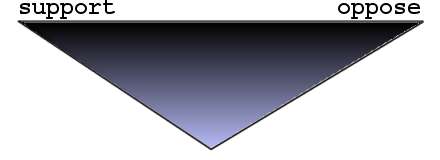'The "two party" system is bad for the US.'
[ support:45% : certainty:65 ] · [30 replies] ·
[1 comment]

|
supporting arguments
72% ·
[make argument]
Debate in the assembly of the country can often be adversarial and not constructive, sometimes revolving around narrowly perceived policy ideas, rather than larger political issues. Sometimes adversarial politics can lead to the opposition disagreeing with everything the government proposes (and vice versa) for the sake of disagreeing. This can lead to important legislation, especially reforms, being blocked that may be beneficial for the country.
100%
· corruption
by metric on 2004-12-18 10:13:53
The system is more easily corrupted by campaign contributions since there are fewer players to donate to.
100%
· I Agree
by anonymous on 2007-05-11 14:27:39
During the 1992 Presidential elections, Ross Perot received 17% of the national vote; a major rebellion of U.S. voters against the two party system. However, when all was said and done that 17% was left with no voice in congress whatsoever. A constitutional amendment instituting a proportional element to our democratic system would a good thing, and would break down the two party system.
75%
· dominant-party
by metric on 2004-12-18 10:05:25
If the opposition party is weak, a dominant-party system may develop.
by metric on 2004-12-18 10:04:00
Candidates are motivated to run negative campaigns, pointing out the flaws in the "other person" (usually the leader of the other party) and staking out only those positions that are necessary to differentiate themselves from their primary opponent and not constructive or beneficial to citizens.
33%
· blackbox
by anonymous on 2005-04-22 17:17:33
Multiple points of view improve the chances that the "right answer" is found.
by seraphblade on 2005-09-29 18:43:58
-Two parties can more easily collude to ensure a result that is desirable to them but undesirable to the voters. Since no other party is an option, neither is the classic recourse of democracy-"vote the bums out", as in this scenario both parties "in power" are the bums. This also reduces recourse for the wrongdoing to be exposed (as there is no one in power with the clout and wish to do so), and creates a cycle that feeds on itself.
-Bribes (campaign contributions) go further when there are only two sets of palms to grease. -Makes it likely that the "check and balance" system integral to constitutional democracy will be corrupted by having large numbers of representatives of a single party at all levels. -Proportional representation would better reflect the "will of all the people", including the minorities, and prevent current problems such as gerrymandering and total exclusion of third parties. |
opposing arguments
27% ·
[make argument]
100%
· Not the real problem
by anonymous on 2005-08-14 17:39:05
I do agree that it is bad, but opposing views should be presented.
The real problem is integrity and the system where, at leat in presidential elections a large majority in theory could loose because of the electoral college, and how the loser in each state is not taken account of.
80%
· voting method
by metric on 2004-12-18 10:10:39
There is no such thing as the "two party system". This system has been directly created from our winner-take-all voting method. first past the post should be replaced by proportional or approval voting methods.
0%
· i oppose
by anonymous on 2010-12-10 09:21:00
the two party system is failing democracy itself. the republicans and democrats always argue about ideas. they think they are both better then eachother.and now that the governement is divided in half.so right there goes checks and balances. now one party will force the other to submit to get what they want. and the voters dont really care aboutwhat the person is talking about they will vote for that person based on his/her party.
that leads to bad people in the government, stealing form the people. that sprobably why america continues to go down the shitter. i say get rid of the parties. vote for the person for what they can do.
|
Powered by Debatepoint.
All text is available under the terms of the GNU Free Documentation License.